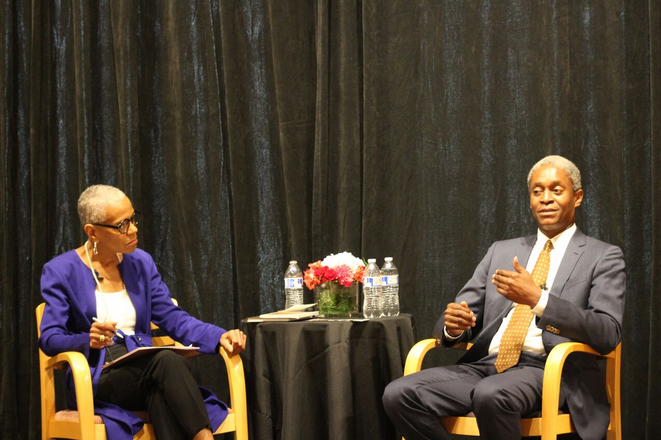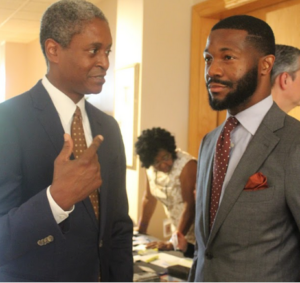
By Ariel Worthy
The Birmingham Times

Raphael Bostic, first African American president and CEO of the Federal Reserve Bank of Atlanta, visited the Birmingham Civil Rights Institute (BCRI) on Tuesday to discuss the Fed’s role in the economy, his role as president of the region and answer questions.
Bostic, who is also the first openly gay man to lead a regional Fed bank and a former Barack Obama administration official, was appointed in 2017.
Sitting in the Odessa Woolfolk Gallery surrounded by portraits of Birmingham Foot Soldiers, Bostic answered questions in front of an audience made up of officials from corporations, banks, nonprofits and government during a conversation with Andrea Taylor, president and CEO of the BCRI.
“Regards to your six states [that you oversee], access to capital, workforce development and support of small business, can you share with us the best example and or best practice you’ve seen in your year of leadership?” asked Birmingham Mayor Randall Woodfin.

Bostic said he has seen strong workforce development programs, but one area he doesn’t see enough is large employers partnering with colleges.
“Many [large employers] already know where there are going to be short workers, they already know where they are struggling to find people with the skills that they need,” Bostic said. “I think they should seriously consider creating the pipeline themselves. I think that is something that can be of value.”
Educator Odessa Woolfolk, for whom the gallery is named, asked about revitalization of cities and affordable housing.
Bostic said, “We don’t give out grants, we don’t do programs, per se . . . I have experts on my staff who work in various areas. I have experts who work in affordable housing. We try to use our expertise in that space.”
Bostic did say affordable housing can be an issue.
“When I came to Atlanta [from Los Angeles], I said ‘this isn’t going to be an issue,’ but they face the same [housing] challenges. It’s also true in Knoxville, TN, here in Birmingham. It’s something more pervasive. When housing is too expensive that probably means more people are chasing housing than what’s available,” Bostic continued. “We need to be thoughtful about what areas in our communities we have a shortage and how do we increase in those areas.”
Josh Carpenter, Director of the City of Birmingham’s Office of Innovation and Economic Opportunity also had a question.
“It seems to me that historically the Fed has focused mainly on monetary policy and often was pretty cloak and dagger, but recently has been more vocal. But also it has been more in the business of making people employable. Can you talk a little about that growth?”
Making people employable has always been the business of the Federal Reserve, Bostic said.
“What has changed is the leadership at a lot of the Reserve Banks where the folks coming in have a deeper appreciation for the importance of engaging in these spaces. There have been business people, but also more academic people. That diversity, we’re much more grounded in community. If the community doesn’t work our job is going to be harder.”
The Atlanta Fed — in the sixth district of the 12 Federal Reserve Banks of the United States — covers Alabama, Florida, and Georgia, the eastern two-thirds of Tennessee, the southern portion of Louisiana, and southern Mississippi as part of the Federal Reserve System. In addition to supporting the U.S. financial system, the Atlanta Fed carries out the supervision and regulation of the banks operating within the sixth district.




